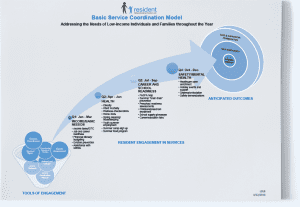Basic Service Coordination Model
How we Address the Needs of Low-Income Individuals and Families Throughout the Year.
Tools of Engagement
- Service Coordinator
- Blended Management
- Community Resource Guides
- Needs Assessment
- Active Outreach
- Referral and Linkage
- Community Resource Guides
- Needs Assessment
Resident Engagement in Services
Q1: JANUARY – FEBRUARY | INCOME/BASIC NEEEDS
- Income taxes/EITC
- Section 8 and employment
- Financial literacy/ budgeting
- Eviction prevention
Q2: APRIL – JUNE | HEALTH
- Obesity
- Infant mortality
- Wellness checks/clinics
- Home visits
- Spring cleaning/housekeeping
- Summer camp sign up
- Summer food program
Q3: JULY – SEPTEMBER | CAREER AND SCHOOL READINESS
- FASFA help
- Summer “brain drain” prevention
- Preschool readiness assessments
- Childcare/preschool enrollment
- School supply giveaways
- Career/education fairs
Q4: OCTOBER – DECEMBER | SAFETY/MENTAL HEALTH
- Healthcare open enrollment
- Holiday events
- Depression/isolation
- Fire safety demos
Anticipated Outcomes
Vibrant Communities
Self-Sufficiency
Housing Stability
What is Service Coordination?
The Resident Services program is operated by Resident Resources Network (RRN), Inc. The program aims to connect residents of the affordable housing developers we partner with to supportive services that promote self-sufficiency and improve their quality of life. Services are coordinated through Service Coordinators, who are on-site to provide residents with information, make referrals to local community organizations, and bring resources on-site.
- What a Service Coordinator Does
- What a Service Coordinator Does Not Do
- How Service Coordinators Help
- Benefits of Service Coordination
- Who is Eligible?
- Assessment. Conducts assessments to identify residents’ service needs.
- Referral and Linkage. Coordinates onsite services, programs and events. Links residents to community services.
- Advocacy. Follows up on referrals made. Serves as liaison between management, the community, families, and service providers. Protects residents’ confidentiality.
- Reporting. Reports on the outcomes and impact of services. Reports suspicion or incidents of abuse, neglect or exploitation, as mandated by law.
- Perform direct services, like the duties of home health aides, nurses or homemakers. They refer residents to services and follow up on outcomes.
- Act as Activity Directors. They can help the resident council with arranging activities.
- Share information provided by residents in confidence with others, including Community Managers.
- Serve as back up Community Managers, Leasing Agents or Drivers.
FAMILIES, SENIORS AND DISABLED PERSONS
Financial/Emergency Assistance.
Assistance with applying for public benefits, accessing food pantries, placing customer service calls, establishing payment plans with bill carriers, etc.
Educational and Employment Assistance.
Assistance with completing college and financial aid applications, bringing mobile libraries on-site, referrals to vocational programs, etc.
Health and Wellness Assistance.
Assistance with signing up for healthcare, bringing mobile dentists on-site, arranging doctors’ appointments, etc.
Legal Assistance.
Assistance with completing forms, reviewing Social Security earnings statements, reviewing death or survivor’s benefits, etc.
Other Assistance.
Assistance with other needs, such as starting a resident council and developing resources guides.
PROPERTY STAFF
Support for Property Staff.
Service Coordinators can take time to address resident needs unrelated to property management.
BENEFITS OF SERVICE COORDINATION
RESIDENTS
- Improved quality of life
- Increased self-sufficiency
- Greater sense of community pride
- Greater independence
- Reduced number of hospitalizations and emergency room visits
OWNERS/PROPERTY STAFF
- Improved resident satisfaction
- Increased length of stay
- Reduced crisis intervention (i.e. domestic violence, gangs, bullying, neighbor disputes)
- Reduced number of evictions
- Reduced number of vacancies
Any resident who lives at a property owned or managed by Wallick Communities is eligible to be served by the Service Coordinator assigned to that property. However, certain community programs and services that the Service Coordinator connects residents to may require that residents meet additional eligibility requirements.

